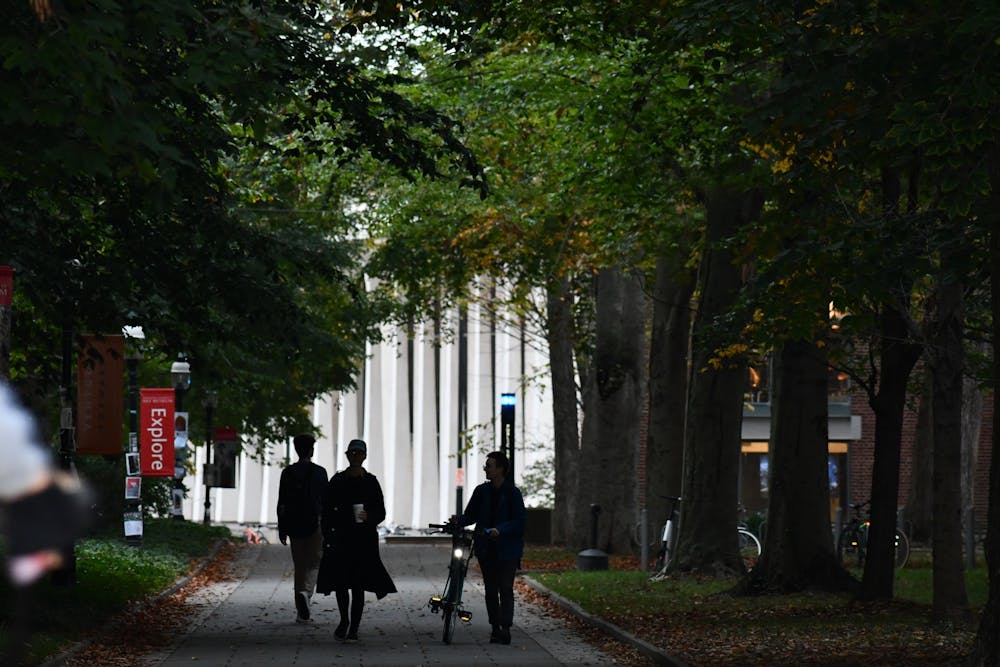In 2021, then-Editor-in-Chief Emma Treadway ’22 challenged the student body to take the collective return from virtual-only learning as an opportunity to change Princeton. One year later, we asked our columnists one thing they’d want to change, big or small, about Princeton in the coming year. Their responses range from heavy-hearted calls for sweeping shifts in culture and policy, to humble pleas for changes in the University’s everyday life.
For our mental health, let’s ditch productivity culture
Mohan Setty-Charity, Senior Columnist
There are far too many stressors on this campus. Classes, clubs, extracurricular activities, campus jobs, sports, the social scene, all contribute to continuously evaluating us on our worth. Incessant pressure to succeed at a high level in every possible part of one's life can lead to deteriorating mental health and overarching feelings of failure. We cannot give room to the belief that productivity defines a person’s value as a human being — we are people first. To shift these sentiments, there needs to be a broader change in culture across campus. Changing the way we do testing, the way we idolize productive capacity, and the notion that we should be anything other than people first could start to pave the way.
Bring back virtual options for classes
Gisele Bisch, Assistant Opinion Editor
The University should reimplement virtual accommodations for students who cannot attend all in-person class activities, perhaps due to being sick or injured. As we saw at the height of COVID-19, Zoom links, lecture recordings, and posted course notes gave students the opportunity to keep up with work even when they were sick, injured, or otherwise unable to come to class in person. As someone who’s witnessed friends fall behind in classes due to illnesses or severe injuries, it is difficult for me to understand why the University would suddenly abandon all virtual accommodations once the campus had a sense of “normalcy” again. As the Editorial Board argued last spring, the two are not mutually exclusive.
Democratize the Board of Trustees
Eleanor Clemans-Cope, Contributing Columnist
There is no democracy at Princeton. The University is overseen by a Board of Trustees, currently 37 members, which controls the budget, endowment, investments, tuition, important academic and admissions matters, and long-term physical planning, including construction. But the Board is dangerously anti-democratic and opaque. Two-thirds of the Trustees, often big-dollar donors, are appointed by the Board itself. Of the remaining elected Trustees (of whom four are Young Alumni Trustees), most are appointed to their ballot by an insular committee, and none are allowed to campaign or publicly take sides on issues. Their decision-making also lacks transparency, making accountability nearly impossible. It couldn’t be more blatant: Princeton doesn’t even pretend to hold genuine democratic values. They don’t care about separating money from power, informed voting, or even voting at all. It’s time to eliminate this sham. Let’s make the Board of Trustees democratic, transparent, and accountable.
Emphasize campus compactness in new construction projects
John Raulston Graham, Contributing Columnist

The completion of the new colleges and the Lake Campus development will mark the end of the last Campus Plan. As we look ahead to the next one, I would urge the University to emphasize compactness and walkability in its plans. The campus’ expansion to the south has resulted in roughly one-fourth of the undergraduate population living a 15-minute walk from Cannon Green. Stretching the campus farther south will result in longer travel distances and the deterioration of the unity of the student body. Princeton’s compactness is what makes the University a more personal school than many of its peer research universities — and we have to make sure to preserve that.

Construction begins on a multi-year project to expand and renovate the southern portion of Dillon Gym.
Candace Do / The Daily Princetonian
Fix the Frist cafes
Sam Harshbarger, Contributing Columnist
Frist Campus Center is a great place for students to get Late Meal, attend class, and retrieve mail. However, the Frist 100 Level retail establishments could use some improvement. For example, Cafe Vivian should re-open for weekday lunches, as it was previously for years. This change would make Frist an even more attractive and effective community-building space for students.
Help students adjust to and make use of the Princeton area
Emily Hove, Contributing Columnist
Princeton’s culture of wealth is reinforced by the fact that students from less affluent backgrounds might struggle to adjust to living in the Princeton area. The town of Princeton is not built for the average college student to live in independently, and while the University tries to create an insulated world with its own self-contained resources, we cannot escape the real world that surrounds our campus. Princeton should provide students with the information necessary to live practically for the four years they spend here. That would include providing better communication of transit options in the area and a concise list of affordable and nearby locations for local shopping and dining.
Make sure divestment actually happens
Nate Howard, Contributing Columnist
Princeton’s recently-announced divestment and dissociation from 90 fossil fuel companies is exciting and encouraging. The University has divested, demonstrating that the demand for divestment was always feasible. It’s now our job to hold the administration accountable: What are the metrics for divestment? When will we meet those metrics? The end date for fossil fuel investment should be long before our net zero goal in 2046, because it shouldn’t take 24 years to divest from fossil fuels. Furthermore, as I argued last semester, there’s no reason we should accept any fossil fuel funding for research. University President Christopher Eisgruber ’83 says that Princeton will serve the world through our research contributions. Let’s do that instead of serving fossil fuel interests.
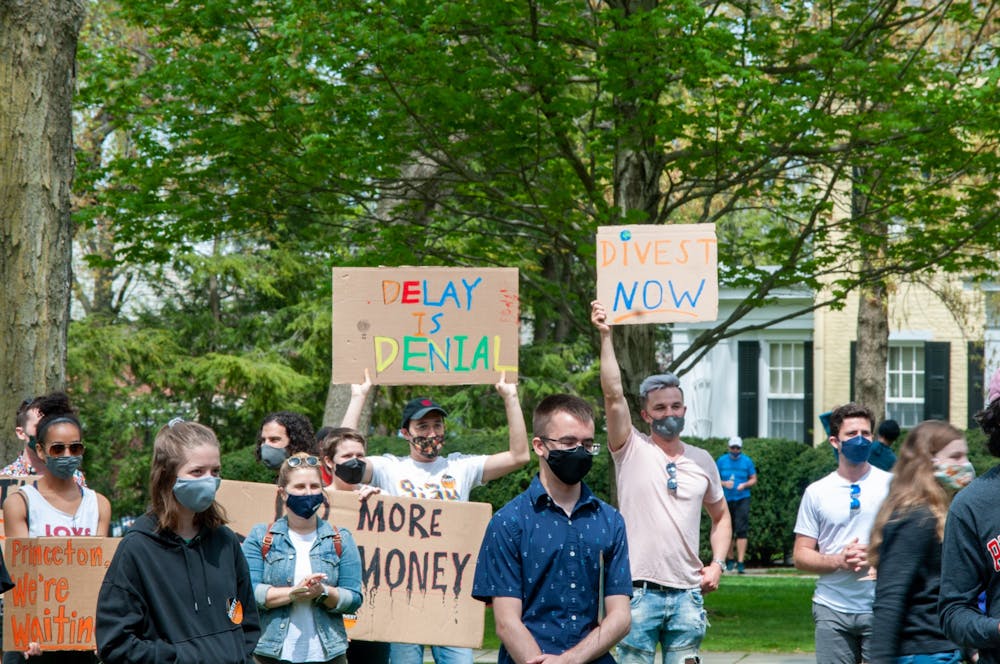
Divest Princeton holds a rally in April 2021.
Justin Cai / The Daily Princetonian
Make Election Day a holiday
Henry Hsiao, Contributing Columnist
To truly champion civic engagement, the University should designate Election Day as a campus-wide holiday. Right now, maintaining a rigid, regular schedule — during voting hours — deprives students and staff of an opportunity to participate in the democratic process; nobody should be forced to choose between casting a ballot and skipping a problem set or paid shift. There’s already precedent at peer institutions for canceling or condensing Election Day classes and thus no good excuse for not doing so here. A voting holiday at Princeton would go a long way towards improving our turnout rates. In the aftermath of a successful referendum to make this change, as Guest Contributors Ana Blanco and Joe Shipley wrote in January, it’s baffling why the University hasn’t acted.
Build Hobson College in a classic Gothic style
Julianna Lee, Contributing Columnist
Since the beginning of the school year, I haven’t been able to shake the feeling that something isn’t quite right with the new colleges. Maybe it’s the shape of the rectangular buildings looming over Poe Field, with little greenery within the complex and seemingly few attempts to merge with the natural environment. Or, maybe it's the bright pink outdoor spaces so at odds with the rest of Princeton's campus. Stepping into the new colleges makes me feel like I’m at a modern tech company, rather than in the warm, cozy Princeton that I know and love. Hobson College will open in 2026 where First College used to stand — a central location on campus. It can either make or break the aesthetic of the university. If Princeton wants to remain Princeton, Hobson should be built to match the collegiate Gothic style of the buildings found north of campus rather than the new colleges.
Improve Princeton platforms including My Housing and TigerHub
Christopher Lidard, Contributing Columnist
The University needs to reimagine its digital platforms. Princeton platforms host portals for some of the most important and long-lasting decisions of its students, including TigerHub — where students declare concentrations and enroll in courses — and My Housing. It’s clear from the look and feel of these platforms that insufficient time and money have been allocated to make them easy to use and aesthetically on par with modern web standards. The backends of these systems that handle data processing also need to be enhanced so that students do not lose out on a fair chance at getting their top courses and housing preferences because of technical issues. Columnist Prince Takano has written extensively on similar issues, and we still haven’t fixed many of them.
Abolish Bicker
Rohit Narayanan, Community Opinion Editor
In 1950, the Class of 1952 decided that Bicker wasn’t working for them — they didn’t think it right that a few sophomores each year wouldn’t get a bid from a selective club. That year, 13 sophomores didn’t get bids. Rejecting compromise attempts by the University, the whole class stood strong until every sophomore was accepted to a club. The whole class banded together on behalf of the 13 kids the eating clubs didn’t want. Just 13. Think about that and think about the reality today where everyone knows how awful Bicker is. As documented in shocking detail by a Cannon alum last year, far more than 13 students are hosed from selective clubs and no one is willing to do anything about it. It’s time for that to change. It’s time to abolish Bicker and embrace a more inclusive selection process for the eating clubs.
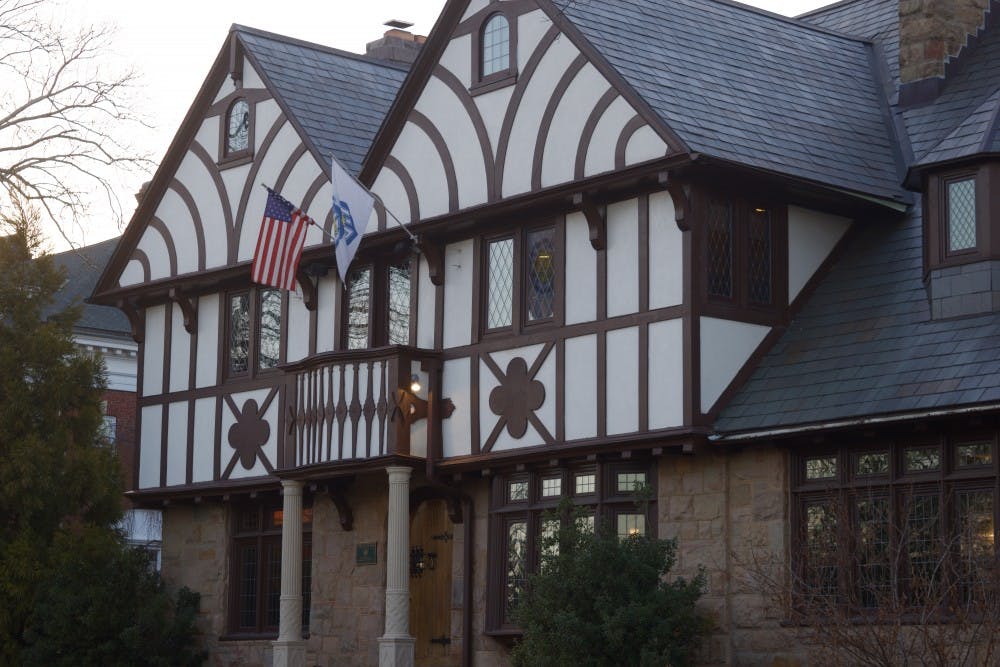
Tiger Inn, one of the Eating Clubs on Prospect Avenue.
Ethan McAlpine / The Daily Princetonian
Extend brunch hours
Windsor Nguyễn, Columnist
Brunch at Princeton has traditionally been from 10 a.m. to 2 p.m. so that students will use the weekend to get some extra sleep. However, students with morning routines are given three options on the weekends: throw away two to three productive hours in the early morning by starting their day at the same time as everyone else, pursue excellence on an empty stomach only to break their work rhythm by getting brunch at 10 a.m., or walk all the way to Butler. The solution is simple: Standardize the dining hall hours. Breakfast should take place between 7:30 a.m. and 11 a.m. and lunch should take place between 11:30 a.m. and 2 p.m every day of the week.
Elevate passion along with achievement in Princeton admissions
Charlotte Pfenning, Contributing Columnist
There is a thriving arts community at Princeton with a plethora of a capella, dance, literature, and music groups. Yet passion for the arts is not highly valued in the University’s admissions process; rather, participation in the arts only seems to count when accompanied by awards, recognition, and success. Princeton should not make students commodify their passions in order to be awarded a spot in the application process. In a recently published piece, Guest Contributor Yejin Suh explains how she felt as though she was “wasting time” in high school if she indulged in creative writing solely for herself. The application process emphasizes external, visible success in the arts. Princeton should shift their priority away from superficial honors and, instead, towards an emphasis on true love and passion that can exist for years beyond the college admissions “rat race.”
Invest in innovative clean energy technologies
David Piegaro, Contributing Columnist
After hearing that Princeton plans to divest from 90 companies associated with fossil fuels, political commentator Matthew Yglesias tweeted that people who care about the climate should take more practical measures to combat climate change. Divesting and dissociating from companies like Exxon moves the ball down the court when it comes to solving the climate crisis, but I think the more important thing that Princeton should do is commit to doubling down on its research towards generating clean energy sources and other climate technologies. Smart commentators from various parts of the political spectrum are coalescing around an abundance agenda or “supply-side progressivism” which emphasizes technological growth as a tool for economic justice. Princeton should champion this philosophy through investing in innovative solutions to global problems.
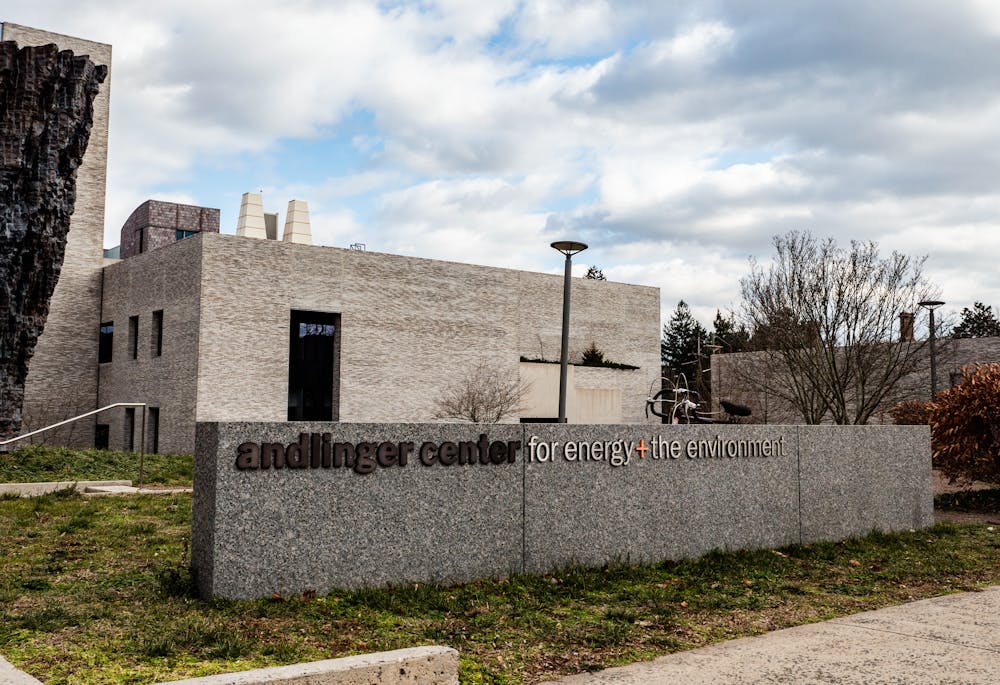
The Andlinger Center for Energy and the Environment
Candace Do / The Daily Princetonian
Make campus less competitive — especially extracurriculars
Abigail Rabieh, Columnist
Princeton boasts one of the lowest acceptance rates in the country — or it did, until it stopped reporting its statistics. Students have spent their lives competing to be the best at everything, and a lot of that effort has been exerted into gaining admittance to Nassau Hall. Yet once first-years arrive, they realize that the competition has only just begun. They must start competing again to get into a wide variety of clubs and extracurricular activities, as then-Assistant Opinion Editor Genrietta Churbanova noted last year. Of course, there are limits to how many new members clubs can take on trips, but aside from that, there are few reasons for Princeton clubs to be as selective as they are. Clubs should strive to be as inclusive as possible, and prefer having more members to being known as a competitive group. We all know that most new recruits just become non-participating “social members” anyway.
Create a curriculum that prioritizes life skills
Laya Reddy, Columnist
Princeton needs a curriculum that imparts life skills. While I value the theoretical education that I get through my concentration and distribution requirements, it’s very rare that the problem sets or precepts will impact our personal and professional lives. A lack of interpersonal and organizational skills such as leadership and time management can hinder otherwise successful graduates from getting ahead. Extracurriculars, sports teams, and internships are often hailed for supplementing these skills, but there’s more to gain from a well-designed, formal education in life skills. A 2014 study found that even a semester of project-based learning could enhance life skills for college students across areas like responsibility, communication, and self-direction. As I wrote in February, project-based classes, especially in STEM fields, could have a major positive impact in bringing those fields to more students, and better preparing them for the world beyond Princeton.
Abolish the Honor Code
Christofer Robles, Contributing Columnist
The Honor Code needs to be abolished. The suggestion that letting students self-administer exams is a signal of “a high standard of academic integrity at Princeton” is pretentious at best. The illusion of integrity means nothing when violations of the Honor Code continue, and students fear retribution more than they revere honesty, as then-Columnist Rohit Narayanan argued last year. An Honor Committee based on demonization, requiring students to investigate and adjudicate their peers, and one that institutionalizes peer to peer policing at the expense of students’ well being seems hardly honorable.
Stop exclusive clubs at Princeton from keeping FGLI students out of opportunities
Tara Shukla, Columnist
Once you get into Princeton — ranked the top undergraduate institution by the U.S. News and World Report — you might think you’re set for success. Especially for first-generation and low-income students, the Ivy League can be a tool for socioeconomic mobility and building generational wealth. However, Princeton’s system of exclusive, application-based clubs undermines the institution’s ability to lift up its students. Many of the benefits of Princeton are based around the networking and pre-professional opportunities associated with attending an Ivy League school. But these benefits aren’t available to all admitted students; a system of social and academic exclusion in the club application process prevents students from getting the most out of the University.
Reform residential college placement
Prince Takano, Contributing Columnist
As Princeton students, we all live in our residential college for our first two years. But have we taken a moment to think: “What makes me proud of my residential college? How do I fit into this community?” For many students, the answer is I do not. Princeton needs to work on building a better sense of community in residential colleges by basing placement on similarities or shared interests rather than randomness. If the University wishes to improve student affinity for residential colleges as an integral part of student life, it needs to incorporate a new placement structure to serve as that basis for affinity.
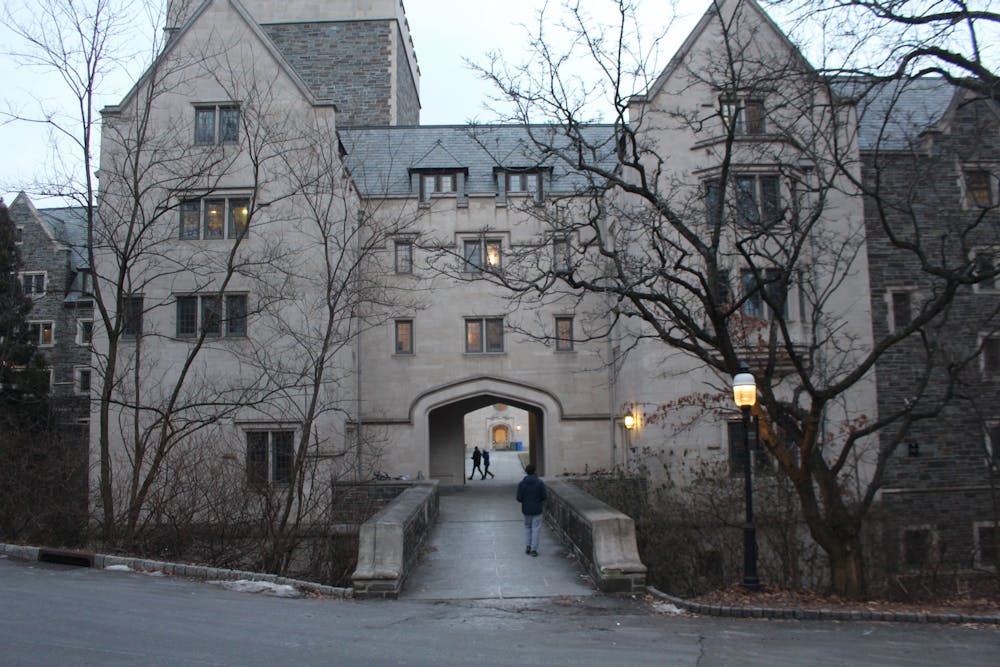
A quiet walk near Whitman College as the spring semester begins.
Abby de Riel / The Daily Princetonian
Bring us better bagels!
Lucia Wetherill, Associate Opinion Editor
Princeton needs better bagels. As a Forbesian, my heart sinks whenever I see the dining hall’s paltry bagel offerings in the morning, especially compared to its other extensive brunch offerings. There are two types of bagel offered: everything and plain. Frankly, to call the hard piece of bread that we’re forced to endure a “bagel” would be generous. Other dining halls have marginally better bagels than Forbes, but we’re in New Jersey — a state second only to New York for its bagel reputation. Princeton ought to take advantage of the plethora of bagel shops in the area, so that students can consistently enjoy them in the dining halls or to go.
Reflect the values of the next generation of donors, not the previous
Eric Xie, Contributing Columnist
Much of Princeton’s endowment comes from wealthy donors. However, in order to incentivize the next generation of Princetonians to donate, the University needs to abandon the outdated philosophies of previous donors, and focus on the future. Committing more strongly to our values of inclusivity and sustainability through our investments and our actions would go a long way towards changing our donor base to be younger and more forward looking.





